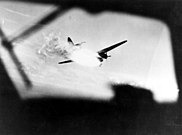| Revision as of 19:32, 25 October 2023 editClueBot NG (talk | contribs)Bots, Pending changes reviewers, Rollbackers6,440,169 editsm Reverting possible vandalism by 38.53.239.161 to version by 209.193.56.110. Report False Positive? Thanks, ClueBot NG. (4277936) (Bot)Tag: Rollback← Previous edit | Revision as of 14:21, 14 November 2023 edit undoAdoTang (talk | contribs)Extended confirmed users5,779 editsNo edit summaryTags: Visual edit Mobile edit Mobile web edit Advanced mobile editNext edit → | ||
| Line 15: | Line 15: | ||
| | total_width = 400 | | total_width = 400 | ||
| }} | }} | ||
| '''Combat''' (] for '''''fight''''') is a purposeful ] conflict |
'''Combat''' (] for '''''fight''''') is a purposeful ] ] between multiple ]s with the intent to harm the opposition. Combat may be armed (using ]s) or unarmed (]). Combat is resorted to either as a method of ] or to impose one's will upon others. An instance of combat can be a standalone confrontation or part of a wider conflict, and its scale can range from a fight between individuals to a ] between organized groups. Combat may also be benign and ]al, as in the cases of ]s and ]. | ||
| Combat may comply with, or be in violation of, local or international laws regarding conflict. Examples of rules include the ] (covering the treatment of people in war), ] ], the ] (covering boxing), and |
Combat may comply with, or be in violation of, local or international laws regarding conflict. Examples of rules include the ] (covering the treatment of people in war), ] ], the ] (covering boxing), and the individual rulesets of various combat sports. | ||
| == Hand-to-hand combat == | == Hand-to-hand combat == | ||
Revision as of 14:21, 14 November 2023
Purposeful violent conflict "Fight" and "Fighting" redirect here. For other uses, see Fight (disambiguation) and Combat (disambiguation).| This article includes a list of general references, but it lacks sufficient corresponding inline citations. Please help to improve this article by introducing more precise citations. (November 2016) (Learn how and when to remove this message) |
 Ground combat: The Battle of Gettysburg by Thure de Thulstrup, depicting the Union Army and Confederate Army clashing during the American Civil War, 1863
Ground combat: The Battle of Gettysburg by Thure de Thulstrup, depicting the Union Army and Confederate Army clashing during the American Civil War, 1863 Naval combat: Sinking of the Esmeralda during the Battle of Iquique by Thomas Somerscales, depicting the Peruvian Navy ironclad Huáscar sinking the Chilean Navy corvette Esmeralda during the War of the Pacific, 1879
Naval combat: Sinking of the Esmeralda during the Battle of Iquique by Thomas Somerscales, depicting the Peruvian Navy ironclad Huáscar sinking the Chilean Navy corvette Esmeralda during the War of the Pacific, 1879 Aerial combat: An Imperial Japanese Navy Mitsubishi G4M on fire after being shot down by a United States Navy Consolidated PB2Y Coronado during World War II, 1944
Aerial combat: An Imperial Japanese Navy Mitsubishi G4M on fire after being shot down by a United States Navy Consolidated PB2Y Coronado during World War II, 1944 Combat sports: Two Irish Defence Forces members hitting each other during a military-sanctioned boxing championship, 2014
Combat sports: Two Irish Defence Forces members hitting each other during a military-sanctioned boxing championship, 2014
Combat (French for fight) is a purposeful violent conflict between multiple combatants with the intent to harm the opposition. Combat may be armed (using weapons) or unarmed (not using weapons). Combat is resorted to either as a method of self-defense or to impose one's will upon others. An instance of combat can be a standalone confrontation or part of a wider conflict, and its scale can range from a fight between individuals to a war between organized groups. Combat may also be benign and recreational, as in the cases of combat sports and mock combat.
Combat may comply with, or be in violation of, local or international laws regarding conflict. Examples of rules include the Geneva Conventions (covering the treatment of people in war), medieval chivalry, the Marquess of Queensberry Rules (covering boxing), and the individual rulesets of various combat sports.
Hand-to-hand combat
Main article: Hand-to-hand combatHand-to-hand combat (melee) is combat at very close range, attacking the opponent with the body (striking, kicking, strangling, etc.) and/or with a melee weapon (knives, swords, batons, etc.), as opposed to a ranged weapon.
Hand-to-hand combat can be further divided into three sections depending on the distance and positioning of the combatants:
Military combat
Main article: WarMilitary combat can involve multiple groups, including guerilla groups, insurgencies, and domestic and/or foreign governments. A military combat situation is known either as a battle or a war, depending on the size of the fighting and which geographical areas in which it occurs. Combat effectiveness has always demanded that the personnel maintain strategic preparedness by being sufficiently trained, armed, equipped, and funded to carry out combat operations in the unit to which they are assigned. Warfare falls under the law of war, which govern its purposes and conduct, and protect the rights of combatants and non-combatants.
References
- North Atlantic Treaty Organization, NATO Standardization Agency AAP-6 – Glossary of terms and definitions, p. 80
Sources
- Martin van Creveld: The Changing Face of War: Lessons of Combat, from the Marne to Turkey. Maine, New England 2007.
Further reading
- Wong, Leonard. 2006. "Combat Motivation in Today's Soldiers: U.S. Army War College Strategic Studies Institute."Armed Forces & Society, vol. 32: pp. 659–663.
- Gifford, Brian. 2005. "Combat Casualties and Race: What Can We Learn from the 2003-2004 Iraq Conflict?" Armed Forces & Society, vol. 31: pp. 201–225.
- Herspring, Dale. 2006. "Undermining Combat Readiness in the Russian Military, 1992-2005." Armed Forces & Society, Jul 2006; vol. 32: pp. 513–531.
- Ben-Shalom, Uzi; Lehrer, Zeev; and Ben-Ari, Eyal. 2005. "Cohesion during Military Operations: A Field Study on Combat Units in the Al-Aqsa Intifada." Armed Forces & Society, vol. 32: pp. 63–79.
- Woodruff, Todd; Kelty, Ryan; Segal, Archie Cooper, David R. 2006. "Propensity to Serve and Motivation to Enlist among American Combat Soldiers." Armed Forces & Society, Apr 2006; vol. 32: pp. 353–366.
- Dienstfrey, Stephen. 1988. "Women Veterans' Exposure to Combat." Armed forces & Society, vol. 14: pp. 549–558.
| Martial arts | |||||||||||||||||||||||||||||
|---|---|---|---|---|---|---|---|---|---|---|---|---|---|---|---|---|---|---|---|---|---|---|---|---|---|---|---|---|---|
| |||||||||||||||||||||||||||||
| |||||||||||||||||||||||||||||